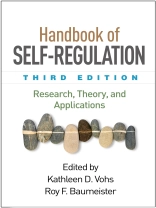From leading authorities, this significantly revised and expanded handbook is a highly regarded reference in a rapidly growing field. It thoroughly examines the conscious and unconscious processes by which people manage their behavior and emotions, control impulses, and strive toward desired goals. Chapters explore such vital issues as why certain individuals have better self-control than others; how self-regulation shapes, and is shaped by, social relationships; underlying brain mechanisms and developmental pathways; and which interventions can improve people’s self-control. The volume also addresses self-regulatory failures and their consequences, with chapters on attention-deficit/hyperactivity disorder, criminality, addictions, and money management challenges. As a special bonus, purchasers of the third edition can download a supplemental e-book featuring two notable, highly cited chapters from the second edition.
New to This Edition
*Incorporates current topic areas, theories, and empirical findings.
*Updated throughout, with 21 new chapters and numerous new authors.
*Cutting-edge topics: implicit self-regulation processes, the role of physical needs and processes (such as the importance of sleep), the benefits of dampening positivity, the frequency and consequences of emotional control in the workplace, and self-regulation training.
*Expanded coverage of motivational factors, romantic relationships, and lapses of self-control.
*Supplemental e-book featuring selected chapters from the prior edition.
สารบัญ
I. Basic Regulatory Processes
1. Self-Regulation of Action and Affect, Charles S. Carver & Michael F. Scheier
2. The Self-Regulation of Emotion: Theoretical and Empirical Advances, Sander L. Koole & Amelia Aldao
3. Self-Control and Ego Depletion, Heather M. Maranges & Roy F. Baumeister
4. Self-Regulation of Implicit Social Cognition, Andrew M. Rivers, Jimmy Calanchini, & Jeffrey W. Sherman
5. Desire and Self-Regulation, Wilhelm Hofmann & Kathleen D. Vohs
6. The Role of Habits in Self-Control, Wendy Wood
II. Cognitive, Physiological, and Neurological Dimensions of Self-Regulation
7. The Cognitive Neuroscience of Self-Regulatory Failure, Dylan D. Wagner & Todd F. Heatherton
8. Pause and Plan: The Physiology of Self-Regulation, Suzanne C. Segerstrom, Ian A. Boggero, & Daniel R. Evans
9. Consensus versus Anarchy in the Senate of the Mind: On the Roles of High Level versus Low Level Construal in Self-Control, Jessica J. Carnevale & Kentaro Fujita
10. Beyond Limited Resources: Self-Control Failure as the Product of Shifting Priorities, Michael Inzlicht & Brandon J. Schmeichel
11. The Essential Role of Sleep in Self-Regulation, Zlatan Krizan & Garret Hisler
12. Automatic Self-Regulation: From Habit to Goal Pursuit, Esther K. Papies & Henk Aarts
13. Planning Promotes Goal Striving, Peter M. Gollwitzer & Gabrielle Oettingen
III. Social, Organizational, and Cultural Dimensions of Self-Regulation
14. Trust and the Perception of Self-Control: Knowing When to Trust Others, Catrin Finkenauer & Francesca Righetti
15. Self-Regulation as a Transactive Process: Reconceptualizing the Unit of Analysis for Goal Setting, Pursuit, and Outcomes, Eli J. Finkel, Gráinne M. Fitzsimons, & Michelle R. van Dellen
16. Regulation Processes in Romantic Relationships, Jeffry A. Simpson, Nickola C. Overall, Allison K. Farrell, & Yuthika U. Girme
17. Religion and Self-Regulation: Integrating Skills-Based and Motivation-Based Accounts, Kristin Laurin & Aaron C. Kay
18. Focusing in on the Emotion Laborer: Emotion Regulation at Work, Drew B. Mallory & Deborah E. Rupp
IV. Personality and Self-Regulation
19. Impulsivity as a Personality Trait, Colin G. De Young & Amanda R. Rueter
20. The Emerging Field of Positive Emotion Dysregulation, Alta du Pont, Keith Welker, Kirsten E. Gilbert, & June Gruber
21. Grit: Sustained Self-Regulation in the Service of Superordinate Goals, Lauren Eskreis-Winkler, James J. Gross, & Angela L. Duckworth
22. Varieties of Self-Control and Their Personality Correlates, Rick H. Hoyle & Erin K. Davisson
V. Development and Self-Regulation
23. The Development of Executive Functions and Self-Regulation: A Bidirectional Psychobiological Model, Clancy Blair
24. Self-Regulation Training, Elliot T. Berkman
25. Effortful Control: Relations with Emotion Regulation, Adjustment, and Socialization in Childhood, Nancy Eisenberg, Cynthia L. Smith, & Tracy L. Spinrad
26. Aging and Self-Regulation, William von Hippel & Julie D. Henry
VI. Self-Regulation Challenges
27. Attention-Deficit/Hyperactivity Disorder and Self-Regulation: Taking an Evolutionary Perspective on Executive Functioning, Russell A. Barkley
28. Self-Control and Crime: Theory, Research, and Remaining Puzzles, Michael Rocque, Chad Posick, & Alex R. Piquero
29. Deciding to Curtail Persistence, Joseph T. Mc Guire & Joseph W. Kable
30. Problems with Positive Thinking and How to Overcome Them, Gabriele Oettingen & Julie Y. A. Cachia
31. Self-Regulatory Failure and Addiction, Michael A. Sayette & Kasey G. Creswell
32. The Role of Self-Regulation in Financial Well-Being, Poornima Vinoo, Kim Ly, & Dilip Soman
Supplemental E-book Featuring Selected Chapters from the Second Edition:
*Self-Efficacy Beliefs and the Architecture of Personality: On Knowledge, Appraisal, and Self-Regulation, Daniel Cervone, Nilly Mor, Heather Orom, William G. Shadel, & Walter D. Scott
*Promotion and Prevention Systems: Regulatory Focus Dynamics within Self-Regulatory Hierarchies, Abigail A. Scholer & E. Tory Higgins
เกี่ยวกับผู้แต่ง
Kathleen D. Vohs, Ph D, is Associate Professor of Marketing at the Carlson School of Management at the University of Minnesota. She holds a Mc Knight Presidential Fellowship and is the Board of Overseers Professor of Marketing. Dr. Vohs has more than 120 professional publications, including six books. Her research is concerned with self-regulation, particularly in regard to impulsive spending and eating, decision making, self-esteem, the fear and feeling of being duped, self-escape behaviors, and the psychology of money.
Roy F. Baumeister, Ph D, is Professor Emeritus of Psychology at Florida State University and at the University of Queensland in Australia. One of social psychology’s most highly cited researchers, Dr. Baumeister has been conducting research, teaching, and thinking about the human self since the 1970s. His work spans multiple topics, including self and identity, self-control, interpersonal rejection and the need to belong, sexuality and gender, violence and evil, self-esteem, self-presentation, emotion, decision making, consciousness and free will, and finding meaning in life. He has written approximately 700 professional publications as well as numerous books for professionals and the general public. Dr. Baumeister is a recipient of awards including the Distinguished Lifetime Achievement Award from the International Society for Self and Identity and the William James Fellow Award, the highest honor of the Association for Psychological Science.












